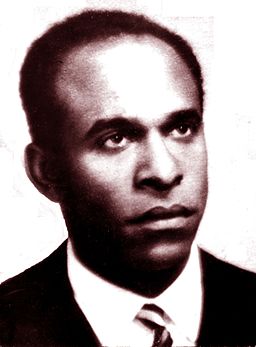 Thomas Meaney in The American Historical Review:
Thomas Meaney in The American Historical Review:
THE IMAGE IS NOT lacking in irony: Frantz Fanon, the intellectual father of Third World revolution, lying in a Maryland hospital bed, watched over by a blue-blooded agent of the CIA. It was out of desperation and his lack of success with Soviet doctors, Fanon’s biographer David Macey reports, that Fanon had agreed to American offers to fly him to the United States—“that country of lynchers,” as he called it—for leukemia treatment. The benefit of aiding the figure who wrote of “a murderous and decisive confrontation” between the colonial and the colonized world was not lost on the CIA. The gesture could have been intended to shore up the United States’ anticolonial credentials in the Cold War, and/or to signal the feebleness of radical national liberation movements whose leaders were compromised by relations with U.S. intelligence. Eight years after Fanon’s death in 1961, Joe Alsop made the latter argument when he leaked the story of the circumstances of Fanon’s last hours in his column in the Washington Post. Writing at a low point in America’s war in Vietnam, Alsop, a leading rhapsodist of pro-war opinion, wanted to score a point at the Third World’s expense. “The chief black hero of the New Left,” he gloated, had died “almost literally in the arms of the CIA.” Alsop savored the CIA case officer’s “downright brotherly visits” to Fanon’s bedside. “Altogether,” he wrote, “it is like saying that Che Guevara died, not because of, but despite the best efforts of the Central Intelligence Agency.” Alsop sent his column to Hannah Arendt, a severe critic of Fanon’s thought and style of expression, whose essay “On Violence” Alsop claimed had “inspired” him. “It almost could move one to tender feelings toward the CIA,” Arendt responded. “Seriously, it shows a certain humanity that is consoling.”
More here.
